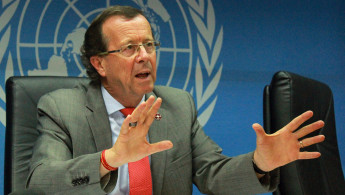Picking up the pieces: Libya envoy faces tough job
Martin Kobler, the new UN special envoy for Libya, has his work cut out.
The 62-year-old seasoned German diplomat began his new job on Tuesday after his predecessor departed under something of a cloud, leaving Kobler to pick up the pieces of the UN peace plan.
Kobler's predecessor, Bernardino Leon, has had to defend himself from charges of a conflict of interest as news emerged earlier this month that he accepted a high-paying job in the UAE.
The UAE is known for its support of the Tobruk government, one of the divided country's two rival legislatures, and earlier this month was implicated in supplying that government's forces with weapons in violation of the international arms embargo on Libya.
"We never expected Leon to be a broker for his own interests," Abubakr Buera, a member of the Tobruk-based House of Representatives who opposed the deal Leon proposed, told the Libya Herald.
| What's been going on in Libya? | |
|
The General National Congress was the Islamist-led elected body ruling Libya for two years following Gaddafi's ousting and death. After its 18-month deadline to form a new constitution passed in January 2014, the body resolved to extend its mandate. |
"We always believed in him as a peacemaker. We never expected him to behave like this," he said.
"He really let us down."
Leon had "massively damaged the UN's credibility", he told the Libyan newspaper.
Leon's peace plan, which involved a power-sharing deal between the country's rival governments, had been widely criticised and rejected by factions on both sides of the country's political divide.
Last week, the outgoing envoy urged Libyan factions to "simply accept" his peace plan, the news website Libya Today reported.
Kobler, the new peace envoy, clearly faces a Sisyphean uphill struggle.
"The leadership transition comes at a critical time for Libya," the UN Press Office said in a statement released on Monday.
"Mr Kobler is committed to ensuring continuity of United Nations facilitation of the Libyan dialogue process, building on what Libyan parties have achieved to date," it added.
He certainly has relevant experience to draw on, having held senior UN posts in Iraq and the Democratic Republic of the Congo.
Though his predecessor has left him with an apparent breakdown of the peace process and damaged the UN's credibility as an impartial mediator, according to Buera, Leon has left Kobler with a strong framework for a political process.
However, he told the Libya Herald, Leon's proposal effectively amounted to creating a government "based on social groups and personal interests".


![President Pezeshkian has denounced Israel's attacks on Lebanon [Getty]](/sites/default/files/styles/image_684x385/public/2173482924.jpeg?h=a5f2f23a&itok=q3evVtko)





